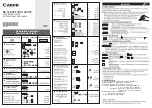
_ (underscore)
expr_unit
Designate the units for expr. All unit names
begin with the underscore.
var_
Treat var as complex if it has no value. By
default, variables without the underscore are
treated as real. Variables with values are treated
as the value type; real or complex. Complex
numbers can be stored in variables without the
underscore, but complex operations work better
if underscores are used.
▶
▶
▶
▶
(convert)
expr_unit1
▶
_unit2
Convert expr with units unit1 to units unit2,
excluding temperature conversions. The units
must be in the same category. Use tmpCnv()
and
„
tmpCnv() for temperature conversions.
10^()
(expr), (list)
Return 10 raised to the power of the argument.
(matrix)
Return 10 raised to the power of square matrix.
This is not the same as 10 raised to the power
of each element. Refer to cos() for calculation
details. matrix must be diagonalizable, and the
result always contains floating-point numbers.
x
-1
(^-1)
expr^-1
list^-1
Return the reciprocal of the argument.
matrix^-1
Return the inverse of square matrix, which must
be non-singular.
| ("with")
expr|Boolean1 [and Boolean2]...[and BooleanN]
Evaluate expr subject to the Boolean contraints.
This allows substitutions, interval constraints
and exclusions. If Boolean is an equality such
as var = value, then each occurence of var in
expr is substituted with value. A constraint is
formed with two or more Booleans joined with
'and', where each Boolean is an inequality. An
exclusion is a Boolean of the form var
≠
value,
which is primarily used to exclude exact
solutions of cSolve(), cZeros(), solve(), etc.
→
→
→
→
(store)
expr
→
var
list
→
var
matrix
→
var
Create var if it does not exist and initialize it to
expr, list or matrix. If var exists and is not locked
or protected, replace its contents with expr, list
or matrix.
expr
→
functionName([parameter1,...])
Create functionName if it does not exist and
initialize it to expr. If functionName exists and is
not locked or protected, replace its contents with
expr. parameters are optional function
arguments.
list
→
functionName([parameter1,...])
matrix
→
functionName([parameter1,...])
Create functionName if it does not exist and
initialize it to list or matrix. If functionName
exists and is not locked or protected, replace its
contents with list or matrix. parameters are
optional function arguments.
©
©
©
©
(comment)
[text]
Process text as a comment line in a program or
function.
©
may be at the beginning of a line or
anywhere within the line. All text to the right of
©
to the end of the line is the comment.
0b, 0h
0bbinaryNumber
0hhexadecimalNumber
Denote a binary or hexadecimal integer. 0b or
0h must be entered regardless of the Base
mode setting, otherwise the number is treated
as decimal (base 10).
15 - 31
Summary of Contents for TI-92+
Page 52: ...Component side of PCB GraphLink I O connector detail 1 41...
Page 53: ...LCD connector detail PCB switch side 1 42...
Page 54: ...Key pad sheet contact side Key pad sheet key side 1 43...
Page 55: ...Key cap detail 1 44...
Page 57: ...Component side of PCB with shield removed A detail view of the intergrated circuits 1 46...
Page 410: ...void extensionroutine2 void Credit to Bhuvanesh Bhatt 10 4...






































